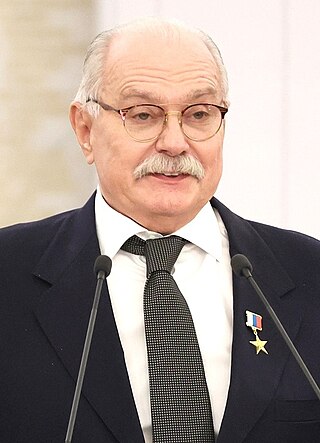
Nikita Sergeyevich Mikhalkov is a Russian filmmaker, actor, and head of the Russian Cinematographers' Union. Mikhalkov is a three-time laureate of the State Prize of the Russian Federation and is a Full Cavalier of the Order "For Merit to the Fatherland".
![<i>Moscow Does Not Believe in Tears</i> 1980 [[Soviet Union]] film](https://upload.wikimedia.org/wikipedia/en/a/a3/Moscow_for_US.jpg)
Moscow Does Not Believe in Tears is a 1980 Soviet romantic drama film made by Mosfilm. It was written by Valentin Chernykh and directed by Vladimir Menshov. The leading roles were played by Vera Alentova and Aleksey Batalov. The film won the Academy Award for Best Foreign Language Film in 1981.
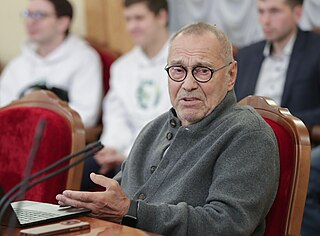
Andrei Sergeyevich KonchalovskyOZO is a Russian filmmaker. He has worked in Soviet, Hollywood, and contemporary Russian cinema. He is a laureate of the Order "For Merit to the Fatherland", a National Order of the Legion of Honour, an Officer of the Order of Arts and Letters, a Cavalier of the Order of Merit of the Italian Republic and a People's Artist of the RSFSR. He is the son of writer Sergey Mikhalkov, and the brother of filmmaker Nikita Mikhalkov.

The cinema of Russia, popularly known as Mollywood, refers to the film industry in Russia, engaged in production of motion pictures in Russian language. The popular term Mollywood is a portmanteau of "Moscow" and "Hollywood".

House of Fools is a 2002 Russian film by Andrei Konchalovsky about psychiatric patients and combatants during the First Chechen War. It stars Julia Vysotskaya and Sultan Islamov and features a number of cameo appearances by Bryan Adams, with the music composed by Eduard Artemyev.
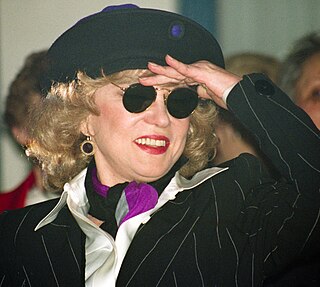
Lyudmila Markovna Gurchenko was a Soviet and Russian actress, singer and entertainer. She was given the honorary title People's Artist of the USSR in 1983.

The Novocherkassk massacre was a massacre carried out by the Soviet army and KGB against unarmed civilians who were rallying on 2 June 1962 in the Soviet city of Novocherkassk. A few weeks prior to the massacre, workers at the Electro Locomotive Novocherkassk plant (NEVZ) had organized a peaceful labor strike. The security forces killed 26 people, according to the official account, in the massacre.

Uncle Vanya is a 1970 film adaptation of the 1899 Anton Chekhov play of the same title and directed by Andrey Konchalovskiy.

The 59th annual Venice International Film Festival was held between 29 August to 8 September 2002.

Julia Aleksandrovna Vysotskaya is a Russian actress and television presenter.

Lyudmila Ivanovna Kasatkina was a Soviet and Russian actress who starred in a string of war-related films directed by her husband Sergey Kolosov.
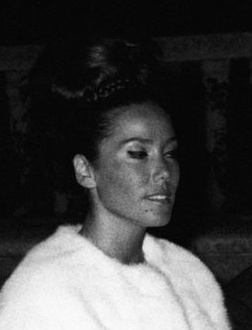
Natalya Utevlevna Arinbasarova is a Russian actress who appeared in more than thirty films since 1965. In 1979 Arinbasarova was named Honored Artist of the RSFSR and in the same year she received the USSR State Prize for her role in The Taste of Bread (1978).
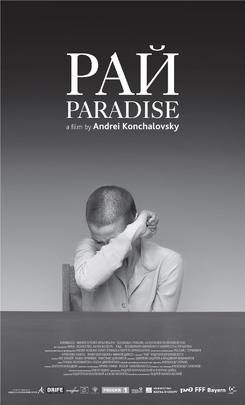
Paradise is a 2016 Russian drama film produced and directed by Andrei Konchalovsky. It was selected to compete for the Golden Lion at the 73rd Venice International Film Festival. At Venice Konchalovsky won the Silver Lion for Best Director. It was selected as the Russian entry for the Best Foreign Language Film at the 89th Academy Awards. In December 2016, it made the shortlist of nine films to be considered for a nomination at the 89th Academy Awards.

A Lover's Romance or Romance for Lovers is a 1974 Soviet musical romantic drama directed by Andrei Konchalovsky.
Irina Vladimirovna Brazgovka is a Soviet and Russian actress of theater and cinema.
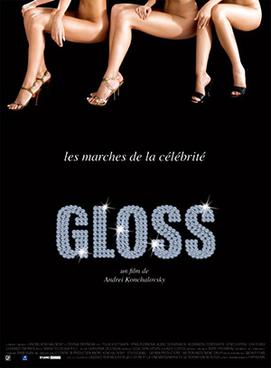
Gloss is a 2007 Russian satirical melodrama directed by Andrei Konchalovsky. The picture opened the 2007 Kinotavr film festival, and was part of the competition program.

Flower on the Stone is a Soviet 1962 drama film directed by Anatoly Slesarenko and Sergei Parajanov.

Maria Vladimirovna Vorontsova, also referred to as Maria Faassen, is a Russian pediatric endocrinologist. She is the eldest child of Russian president Vladimir Putin.

The 77th annual Venice International Film Festival was held from 2 to 12 September 2020, albeit in a "more restrained format" due to the COVID-19 pandemic.

Sun Children, also known as The Sun, is a 2020 Iranian drama film co-produced, co-written and directed by Majid Majidi. It was presented in competition at the 77th Venice International Film Festival, where child actor Rouhollah Zamani won the Marcello Mastroianni Award. It was selected as the Iranian entry for the Best International Feature Film at the 93rd Academy Awards, making the shortlist of fifteen films.


![<i>Moscow Does Not Believe in Tears</i> 1980 [[Soviet Union]] film](https://upload.wikimedia.org/wikipedia/en/a/a3/Moscow_for_US.jpg)
















